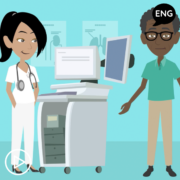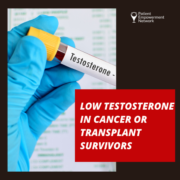Tools for Becoming an Educated and Empowered Prostate Cancer Patient
Tools for Becoming an Educated and Empowered Prostate Cancer Patient from Patient Empowerment Network on Vimeo.
What steps can you take to become an empowered prostate cancer patient? In this animated video, you’ll learn tools for self-education and self-advocacy to help you partner in your care decisions.
See More From Shared Decision Making: Navigating Prostate Cancer Care
Related Resources:

|

Building a Relationship With Your Prostate Cancer Healthcare Team |

|
Transcript:
Niki:
Hi! I’m Niki, and I’m a prostate cancer nurse practitioner. And this is Anthony, who is living with advanced prostate cancer.
Together, we’re going to guide you through a series of videos to help you learn more about prostate cancer and give you steps to play an active role in your care and treatment decisions.
First, I want to introduce you to the organization responsible for this video—the Patient Empowerment Network—or “PEN.”
PEN’s mission is simple. It’s to provide cancer patients and care partners with the knowledge and tools to boost their confidence, put them in control of their healthcare journey, and assist them in their goal of receiving the best, most personalized care available.
[Patient experience depicted in this video is fictional.]
Anthony:
So, what does it mean to be an empowered patient? The World Health Organization defines it as “a process through which people gain greater control over decisions and actions affecting their health.”1
When I was first diagnosed with prostate cancer, I was overwhelmed, and I didn’t feel comfortable sharing my concerns and opinions. But through finding out more about my disease, working together with my team and learning to advocate for myself, I felt more in control and more confident speaking up.
Niki:
Exactly, Anthony. One of the first steps to becoming an empowered patient is to educate yourself about your disease. You can start learning about your prostate cancer by:
- Making sure you can access your online patient portal, if available, so you can view your medical records, communicate with your healthcare team, and access resources when you need them. If you don’t know how to use the patient portal, just ask your doctor’s office – they should have a set of instructions on hand.
- You can also visit credible prostate cancer advocacy groups to learn about your condition. These organizations are typically an excellent source of information and support. Ask your healthcare team for recommendations.
Remember, online information is never a substitute for medical advice. You should always consult your doctor about what you’ve learned. This will become easier as you get a better understanding of your disease and feel more comfortable sharing with your healthcare team.
Anthony:
That’s right, Niki. But, as I learned firsthand, speaking up is not always easy. Here are some tips that helped me:
- Write down your questions before your appointments. Visit powerfulpatients.org/pc to access office visit planners to help you organize your notes.
- And, try to bring a friend or loved one to your appointments to help you remember information and to take notes for you.
- Another tip is to be honest about how you feel and share any treatment side effects or symptoms you may be having with your healthcare team. Your doctor wants to know how you are doing and may be able to help you if you are having issues.
- It’s also a good idea to consider a second opinion to help you feel confident in your care and to provide piece of mind. This is especially important if you feel like you are not being heard.
- And, lastly, you have a voice in your care decisions. Don’t hesitate to ask questions – YOU are your own best advocate.
Niki:
That’s great advice, Anthony! We’ve covered a lot. So don’t forget to download the guide that goes with this video—it can help you remember what we’ve discussed.
Anthony:
And visit powerfulpatients.org/PC to view more videos with Niki and me. Thank you for joining us!










